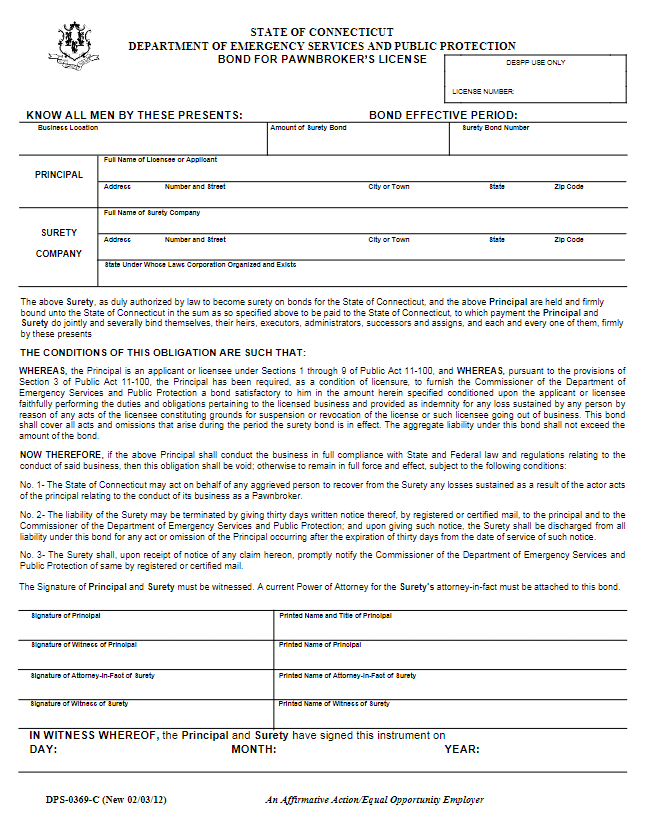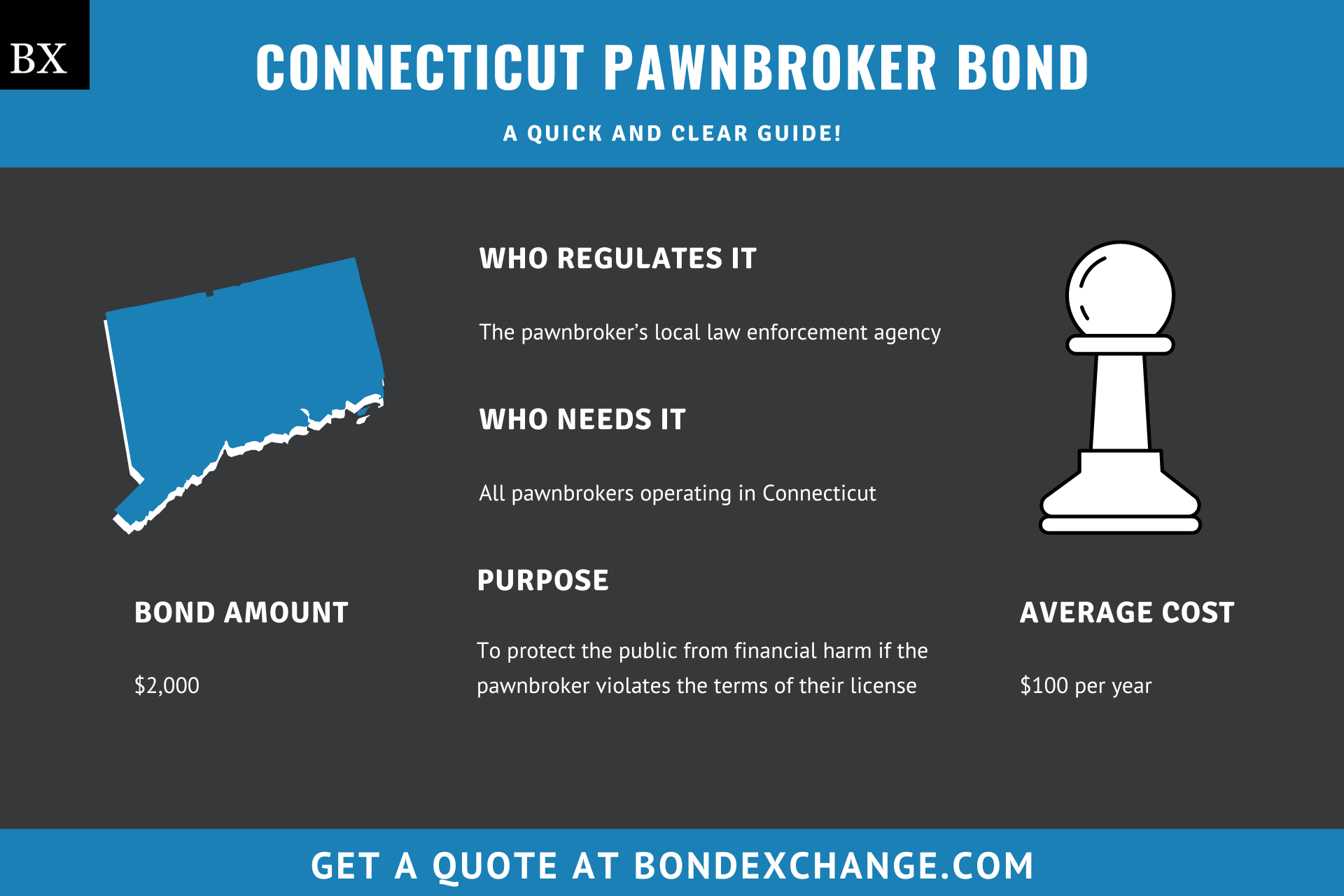Connecticut Pawnbroker Bond: A Comprehensive Guide
This guide provides information for insurance agents to help their customers obtain a Connecticut Pawnbroker bond.
At a Glance:
- Average Cost: $100 per year or $10 per month
- Bond Amount: $2,000
- Who Needs it: All pawnbrokers operating in Connecticut
- Purpose: To protect the public from financial harm if the pawnbroker violates the terms of their license
- Who Regulates Pawnbrokers in Connecticut: The pawnbroker’s local law enforcement agency

Background
Connecticut General Statute 21-39 requires all pawnbrokers operating in the state to obtain a license from their local police department before conducting business. The Connecticut legislature enacted the licensing requirement to ensure that pawnbrokers engage in ethical business practices. To provide financial security for the enforcement of the licensing law, pawnbrokers must purchase and maintain a $2,000 surety bond to be eligible for licensure.
Pawnbrokers who do not have an organized police department in their city or town must obtain a license from the Department of Emergency Services and Public Protection.
What is the Purpose of the Connecticut Pawnbroker Bond?
Connecticut requires pawnbrokers to purchase a surety bond as part of the application process to obtain a pawnbroker license. The bond ensures that the public will be protected from financial harm if the broker fails to comply with the regulations set forth in the Connecticut General Statute 21-40. Specifically, the bond protects the public in the event the broker engages in any acts of fraud or breaches consumer contracts. In short, the bond is a type of insurance that protects the public if the pawnbroker violates the terms of their license.
How Can an Insurance Agent Obtain a Connecticut Pawnbroker Surety Bond?
BondExchange makes obtaining a Connecticut Pawnbroker bond easy. Simply log in to your account and use our keyword search to find the “Pawnbroker” bond in our database. Don’t have a login? Gain access now and let us help you satisfy your customers’ needs. Our friendly underwriting staff is available by phone at (800) 438-1162, email, or chat from 7:30 AM to 7:00 PM EST to assist you.
At BondExchange, our 40 years of experience, leading technology, and access to markets ensures that we have the knowledge and resources to provide your clients with fast and friendly service whether obtaining quotes or issuing bonds.
Not an agent? Then let us pair you with one!
Click the above image to find a BX Agent near you
Is a Credit Check Required for the Connecticut Pawnbroker Bond?
Surety companies will run a credit check on the applicant to determine eligibility for the Connecticut Pawnbroker bond. The credit check is a “soft hit”, meaning that the credit check will not affect the applicant’s credit.
How Much Does the Connecticut Pawnbroker Bond Cost?
The Connecticut Pawnbroker bond costs just $100 per year or $10 per month.
Who is Required to Purchase the Connecticut Pawnbroker Bond?
Connecticut requires pawnbrokers to purchase a surety bond as a prerequisite to obtaining a pawnbroker license. To paraphrase Connecticut General Statute 21-39a, a pawnbroker is a person who issues loans to individuals that leave their property, as collateral, for the broker to sell on condition that the customer may repurchase the property within a fixed period of time.
Applicants for a pawnbroker license who are already licensed as secondhand dealers in Connecticut are not required to purchase a $2,000 surety bond. Secondhand dealers in Connecticut must purchase a $10,000 surety bond, and maintaining this $10,000 bond will satisfy the bond requirement for a pawnbroker license as well.
BondExchange now offers monthly pay-as-you-go subscriptions for surety bonds. Your customers are able to purchase their bonds on a monthly basis and cancel them anytime. Learn more here.
How Do Pawnbrokers Apply for a License in Connecticut?
Pawnbrokers in Connecticut must navigate several steps to secure a pawnbroker license. Below are the general guidelines, but applicants should refer to the licensing statutes for details on the process.
License Period – All Connecticut Pawnbroker Licenses are valid for one year from the date of issuance and must be renewed before the expiration date.
Step 1 – Contact Your Local Law Enforcement Agency
To obtain a license, pawnbrokers must contact their local law enforcement agency. The agency will walk them through the application process, provide them with all required forms, and answer any questions they may have. All license applications will, at a minimum, require the following information:
-
- The broker’s full name and business name
- Residence and employment history
- A record of all criminal convictions
- A full set of the broker’s fingerprints
Pawnbrokers must get the application notarized and pay a $50 application fee. Applicants who do not have an organized police department in their city or town must apply for a license with the Department of Emergency Services and Public Protection.
Step 2 – Purchase a Surety Bond
Pawnbrokers operating in Connecticut are required to purchase and maintain a $2,000 surety bond.
How do Connecticut Pawnbrokers Renew Their License?
Pawnbrokers should contact their local law enforcement agency to obtain a renewal application before their license expires. Pawnbrokers must renew their licenses at least sixty days before the expiration date to avoid a lapse in coverage. All Connecticut Pawnbroker Licenses are valid for one year from the date of issuance and must be renewed before the expiration date.
What are the Insurance Requirements for Connecticut Pawnbrokers?
Connecticut does not require pawnbrokers to purchase any form of liability insurance. Pawnbrokers must purchase and maintain a $2,000 surety bond.
How Do Connecticut Pawnbrokers File Their Bonds?
Pawnbrokers should submit their completed bond forms, including the power of attorney, to their local law enforcement agency.
The surety bond requires signatures, including witness signatures, from both the surety company that issues the bond and from the broker. The surety company should include the following information on the bond form:
- Legal name and address of the entity/individual(s) buying the bond
- Surety company’s name, address, and state of incorporation
- Pawnbroker’s business address
- Bond amount
- Date the bond is signed
What Can Connecticut Pawnbrokers Do to Avoid Claims Against Their Bonds?
To avoid claims against their bonds, pawnbrokers in Connecticut must ensure that they:
- Do not engage in any acts of fraud
- Do not breach contracts made with consumers
What Other Insurance Products Can Agents Offer Pawnbrokers in Connecticut?
Connecticut does not require pawnbrokers to purchase liability insurance as a prerequisite to obtaining a pawnbroker license. However, most reputable businesses will purchase this insurance anyway. Bonds are our only business at BondExchange, so we do not issue any other types of insurance, but our agents often utilize brokers for this specific line of business. Agents can access a list of brokers online here.
How Can Insurance Agents Prospect for Connecticut Pawnbroker Customers?
Connecticut unfortunately does not provide a public database of active pawnbrokers in the state. However, we suggest contacting the Department of Emergency Services and Public Protection for a list of licensed pawnbrokers. Contact BondExchange for additional marketing resources. Agents can also leverage our print-mail relationships for discounted mailing services.


